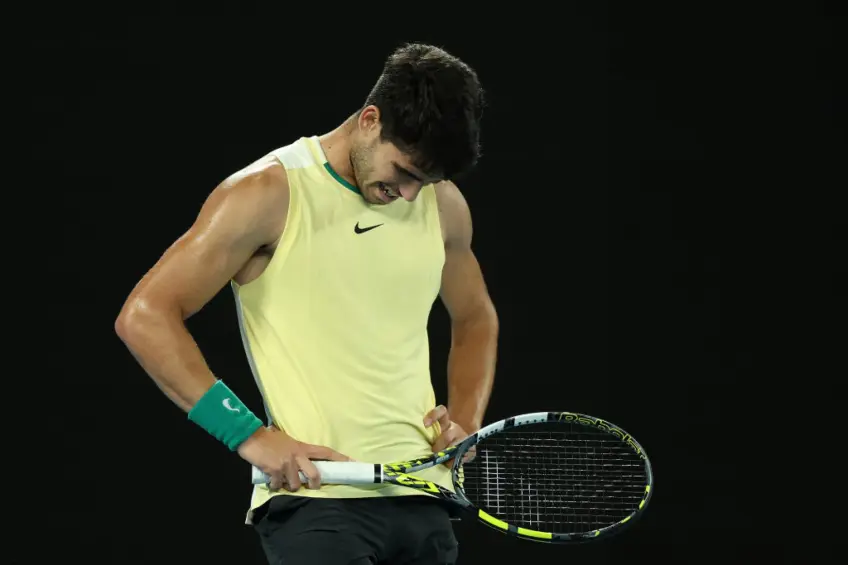
Carlos Alcaraz, the young Spanish tennis prodigy, entered the 2024 Australian Open with high expectations. After meticulously preparing for the season, he opted to skip official tournaments leading up to Melbourne, focusing instead on his performance at the year’s first Grand Slam. Unfortunately, Alcaraz’s campaign came to a disappointing end in the quarterfinals, where he was soundly defeated by Germany’s Alexander Zverev, leaving fans and experts puzzled by his noticeable dip in form. Meanwhile, Italian star Jannik Sinner, who had followed a similar pre-tournament strategy, reached the final after a sensational victory over Novak Djokovic, sparking a debate about the current state of Alcaraz’s game and the contrast with Sinner’s mentality.
In a recent episode of *La Telefonata*, a podcast hosted by tennis legends Adriano Panatta and Paolo Bertolucci, the discussion turned to Alcaraz’s struggles. Panatta, who famously won the 1976 Roland Garros title, offered a blunt assessment of Alcaraz’s recent performances. He pointed out that the young Spaniard, who had shown so much promise in the first half of 2023, appeared to be regressing rather than progressing. Panatta highlighted the psycho-physical decline of Alcaraz, drawing a stark comparison between the Spaniard and his contemporary, Jannik Sinner.
“Alcaraz hasn’t evolved; in fact, he’s gone a step back,” Panatta remarked. “He has a rather bizarre attitude on the court. I don’t see the same determination he had two years ago. He laughs, he jokes, and it seems like he doesn’t care. I don’t know what’s wrong with him, but in my opinion, he has yet to decide what kind of player he really wants to be. Mentally, he is behind. Sinner, on the other hand, is in a completely different category. He’s cut from the same cloth as Djokovic.”
Panatta’s harsh critique of Alcaraz comes after a period of relative decline for the Spaniard. Despite his victory at Wimbledon over Novak Djokovic in 2023, Alcaraz has struggled to replicate that level of success. After Wimbledon, Alcaraz only reached one final, at the ATP Masters 1000 in Cincinnati, where he lost to Djokovic. In the last eight tournaments he played, Alcaraz has not managed to find the same consistency that once made him a dominant force on the ATP tour. His quarterfinal defeat to Zverev in Melbourne further fueled concerns about his form, with the Spaniard playing a tense and error-prone match.
Alcaraz’s early struggles in 2024 stand in contrast to Jannik Sinner’s meteoric rise. The Italian has demonstrated significant growth, both mentally and physically, under the guidance of coaches Darren Cahill and Simone Vagnozzi. Sinner’s stunning victory over Djokovic in the Australian Open semifinals, breaking the Serbian’s remarkable undefeated streak in Australia that spanned over 2,000 days, is a testament to his improved mentality and game. While Alcaraz appears to be grappling with uncertainty, Sinner has displayed laser-like focus and determination, qualities that Panatta believes have put the Italian on a trajectory toward greatness.
Nick Kyrgios, who has been providing commentary for Eurosport during the Australian Open, offered a more sympathetic view of Alcaraz’s performance. While Panatta’s critique centered on the Spaniard’s attitude and mental state, Kyrgios pointed out that Zverev’s extraordinary performance was also a factor in Alcaraz’s defeat.
“For the first time, Alcaraz showed himself to be human,” Kyrgios remarked. “I had never seen him like this before. He wasn’t as incredible as we’ve come to expect, but you have to give credit to Zverev. He’s had an incredible journey to get to this point, and his tennis was impeccable. He finished the match with 85% of his first serves, numbers we don’t often see from him. Alcaraz was nervous, but Zverev remained calm and composed throughout.”
Despite the loss, Alcaraz took a reflective approach in his post-match comments. Analyzing his performance, the young Spaniard acknowledged the ups and downs of the match and recognized the need for improvement. “I’m grateful to have played great tennis at the end of the third set. At the beginning of the fourth, I wasn’t able to maintain the same level, which was a shame. But I still found a way to break him and stay in the game. I didn’t take advantage of my opportunities, though, and my serve wasn’t at its best.”
Alcaraz also spoke about the expectations placed on him and the absence of his coach, Juan Carlos Ferrero, who was unable to travel to Australia due to knee surgery. Despite Ferrero’s absence, Alcaraz expressed confidence in his support team, saying, “I was playing great tennis even without him. I trust the people in my box 100%.”
Looking ahead, Alcaraz remains optimistic about his progress, despite the disappointment of not advancing further in Melbourne. “It was a great tournament for me, reaching the quarterfinals and playing some good tennis. I’m disappointed with the level I showed today, especially because I had been playing much better in previous rounds. The quarterfinals aren’t the result I wanted, but I’ll take it as a learning experience and keep working.”
For Alcaraz, the challenge now is to rediscover the form and mental clarity that made him a Grand Slam champion. With many points to defend in the upcoming months, including victories at ATP 500 events in Rio de Janeiro and Barcelona, and the ATP Masters 1000 titles in Indian Wells and Madrid, Alcaraz will need to make a “change of pace” to maintain his position among the sport’s elite.
Meanwhile, Sinner’s rise continues unabated. With his combination of mental toughness, physical endurance, and tactical intelligence, the young Italian has emerged as a serious contender for Grand Slam titles. As Panatta suggested, Sinner’s mentality may indeed set him apart from his peers, as he appears to have the focus and discipline necessary to rival the game’s greatest players, including Djokovic and perhaps even Alcaraz—should the Spaniard manage to regain his footing.
Leave a Reply